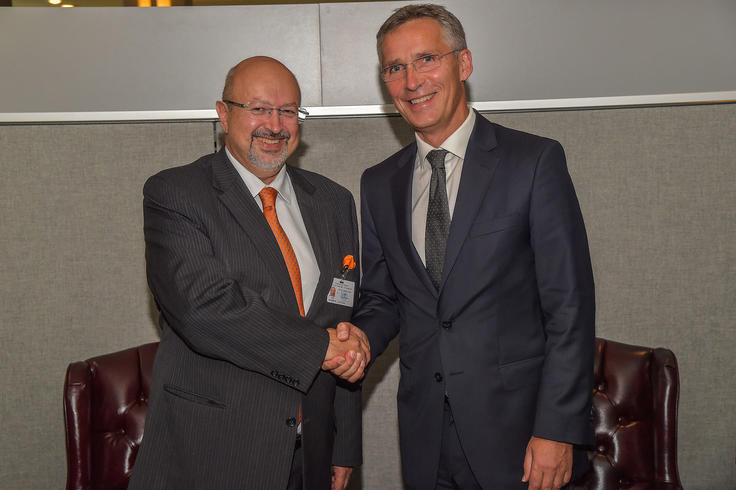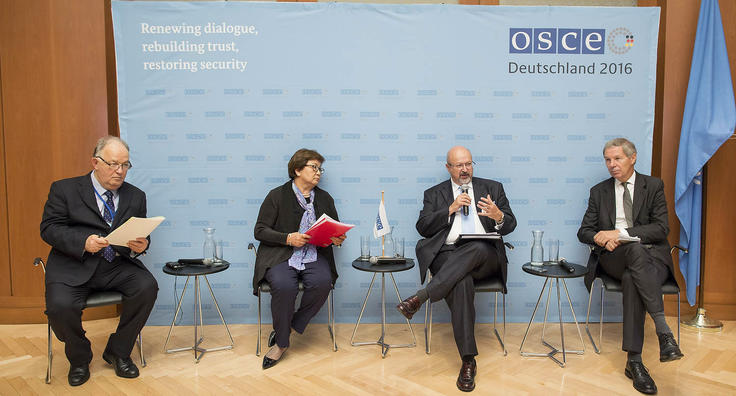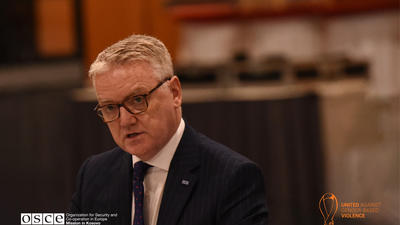-
Our work
-
Fields of work
- Arms control
- Border management
- Combating trafficking in human beings
- Conflict prevention and resolution
- Countering terrorism
- Cyber/ICT Security
- Democratization
- Economic activities
- Education
- Elections
- Environmental activities
- Gender equality
- Good governance
- Human rights
- Media freedom and development
- Migration
- National minority issues
- Policing
- Reform and co-operation in the security sector
- Roma and Sinti
- Rule of law
- Tolerance and non-discrimination
- Youth
- Field operations
- Projects
-
Meetings and conferences
- Summit meetings
- Review Conferences
- Ministerial Council meetings
- Plenary meetings of the Permanent Council
- Plenary Meetings of the Forum for Security Co-operation
- Security Review Conferences
- Annual Implementation Assessment Meetings
- Economic and Environmental Forum
- Economic and Environmental Dimension Implementation Meetings
- Human rights meetings
- Media conferences
- Cyber/ICT security conferences
- Conference of the Alliance against Trafficking in Persons
- Gender equality conferences
- Annual OSCE Mediterranean conferences
- Annual OSCE Asian conferences
- Partnerships
-
Fields of work
-
Countries
- All
-
Participating States
- Albania
- Andorra
- Armenia
- Austria
- Azerbaijan
- Belgium
- Belarus
- Bosnia and Herzegovina
- Bulgaria
- Canada
- Croatia
- Cyprus
- Czechia
- Denmark
- Estonia
- Finland
- France
- Georgia
- Germany
- Greece
- Holy See
- Hungary
- Iceland
- Ireland
- Italy
- Kazakhstan
- Kyrgyzstan
- Latvia
- Liechtenstein
- Lithuania
- Luxembourg
- Malta
- Moldova
- Monaco
- Mongolia
- Montenegro
- The Netherlands
- North Macedonia
- Norway
- Poland
- Portugal
- Romania
- Russian Federation
- San Marino
- Serbia
- Slovakia
- Slovenia
- Spain
- Sweden
- Switzerland – OSCE Chairpersonship 2026
- Tajikistan
- Türkiye
- Turkmenistan
- Ukraine
- United Kingdom
- United States of America
- Uzbekistan
- Asian Partners for Co-operation
- Mediterranean Partners for Co-operation
-
Structures and institutions
- Chairpersonship
-
Secretariat
- Secretary General
- Office of the Secretary General
- Conflict Prevention Centre
- Transnational Threats Department
- Office of the Special Representative and Co-ordinator for Combating Trafficking in Human Beings
- Office of the Co-ordinator of OSCE Economic and Environmental Activities
- Gender Issues Programme
- Opportunities for Youth
- Department of Human Resources
- Department of Management and Finance
- Office of Internal Oversight
- Documentation Centre in Prague
- Institutions
-
Field operations
- Presence in Albania
- Centre in Ashgabat
- Programme Office in Astana
- Programme Office in Bishkek
- Mission to Bosnia and Herzegovina
- Programme Office in Dushanbe
- Mission in Kosovo
- Mission to Moldova
- Mission to Montenegro
- Mission to Serbia
- Mission to Skopje
- Project Co-ordinator in Uzbekistan
- Closed field activities
- Parliamentary Assembly
- Court of Conciliation and Arbitration
- Organizational structure
- About us

Story
Secretary General Lamberto Zannier attends the 71st United Nations General Assembly
- Date:
- Source:
- OSCE Secretary General
- Fields of work:
- Human rights, Migration
OSCE Secretary General Lamberto Zannier attended the high-level segment of the 71st session of the United Nations General Assembly in New York from 19 to 23 September 2016. During this visit, he had a series of bilateral meetings with foreign ministers, senior UN officials and regional organizations on the margins of the United Nations General Assembly. Zannier also addressed the first-ever United Nations Summit for Refugees and Migrants, which aimed to develop a more comprehensive and co-operative response to addressing large movements of refugees and migrants.
In his address to the Summit’s plenary meeting on 19 September, Secretary General Zannier reaffirmed the crucial, positive role that migration can play in the development of societies. He advocated for good migration governance to respond to both irregular migration flows and human trafficking and called for the promotion of tolerance and non-discrimination to strengthen inclusive societies and foster effective integration of newcomers.
“It is my belief that States should seize the initiative and use today’s Summit to set new global principles,” said Zannier. “As the largest regional arrangement under Chapter VIII of the UN Charter, the OSCE stands ready to work with other regional organizations and the UN to ensure the regional application of new global guidelines. As part of the Summit’s follow-up, we can explore a roadmap for regional organizations to act as gateways to global action.”
On 20 September, Zannier met with the Secretary General of the North Atlantic Treaty Organization (NATO), Jens Stoltenberg, to discuss the OSCE’s efforts to address the crisis in Ukraine and ways to resume the much-needed dialogue to revitalize the conventional arms control regime in Europe. Both Stoltenberg and Zannier agreed that engagement in the fields of military transparency and predictability are crucial to the future of European security, and restated their commitment to co-operation and dialogue among partner organizations.
On 22 September, Secretary General Zannier moderated a side event organized by the German OSCE Chairmanship on the margins of the UN General Assembly devoted to “The Force of Civilian Crisis Management: Strengthening the Capacities of the OSCE as a Chapter VIII Organization” which featured an interactive debate on strengthening the civilian peacekeeping capacities of the OSCE.
As the complexity of crisis management increases, the OSCE has significantly stepped up its crisis response operations, most visibly through its on-going civilian operations in Ukraine. But much more can be done.
“As the complexity of crisis management increases, the OSCE has significantly stepped up its crisis response operations, most visibly through its on-going civilian operations in Ukraine,” Secretary General Zannier stated. “But much more can be done. I call on the OSCE participating States to further enhance the Organization’s capabilities in civilian crisis management and pledge to continue our close co-operation with the United Nations at the strategic and operational level.”
On 25 September, Zannier addressed the Ministerial Meeting of the Group of Friends of the UN Alliance of Civilisations titled “Combatting xenophobia through fostering inclusive dialogue”. He spoke about how xenophobia endangers peace and security, and called for action to confront intolerance directly by advancing dialogue and mutual understanding within communities.
We must focus on what unites us rather than what divides us, and spread the message that diverse societies are also strong and resilient societies that benefit all their members.
“We need to move away from the defensive and alarmist tone that predominates today and reframe the debate with a different narrative that on the one hand recognizes and addresses the root causes of displacement, and on the other promotes tolerance for diversity,” stated Zannier. “We must focus on what unites us rather than what divides us, and spread the message that diverse societies are also strong and resilient societies that benefit all their members.”
Before his departure from New York, Secretary General Zannier paid a farewell visit to United Nations Secretary-General Ban Ki-moon. Secretary-General Ban praised the OSCE for all its efforts to address the Ukrainian crisis end encouraged it to keep up its active engagement on the political and operational front. Zannier thanked Secretary-General Ban for his exceptional commitment in promoting peace and security during his tenure in office. He reiterated the OSCE’s commitment to continuing to strengthen the well-established co-operation between the United Nations and the OSCE to address challenges to regional and global security.
OSCE Impact
Discover more stories about how the OSCE improves lives.




